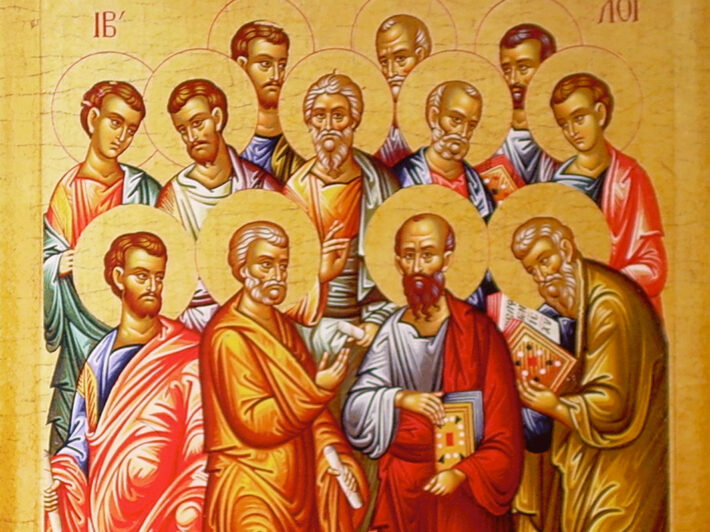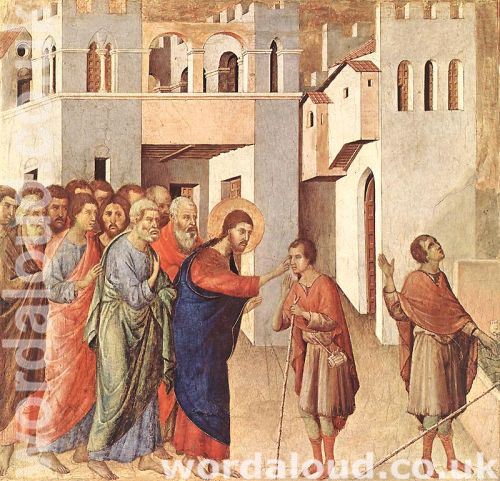Christian Art | Jesus Chooses Twelve Apostles | King James Audio Bible | Gospels | KJV
Luke 6: 12-19 – Week 23 Ordinary Time, Tuesday (King James Audio Bible KJV, Spoken Word)
12 And it came to pass in those days, that he went out into a mountain to pray, and continued all night in prayer to God.
13 ¶ And when it was day, he called unto him his disciples: and of them he chose twelve, whom also he named apostles;
14 Simon, (whom he also named Peter,) and Andrew his brother, James and John, Philip and Bartholomew,
15 Matthew and Thomas, James the son of Alphæus, and Simon called Zelotes,
16 And Judas the brother of James, and Judas Iscariot, which also was the traitor.
17 ¶ And he came down with them, and stood in the plain, and the company of his disciples, and a great multitude of people out of all Judæa and Jerusalem, and from the sea coast of Tyre and Sidon, which came to hear him, and to be healed of their diseases;
18 And they that were vexed with unclean spirits: and they were healed.
19 And the whole multitude sought to touch him: for there went virtue out of him, and healed them all.
Since beginning his ministry, Jesus has called his first disciples to follow him. Now it is time to choose, from his disciples, the twelve who are to be called Apostles, that is those who are to be most especially sent to preach, on mission, and to found and to lead the Church. There are key, notable stages as Jesus constitutes his Church – the Apostles will be fully confirmed in their mission on the day of Pentecost. This is one such important stage.
Accordingly, Jesus goes out alone into the hills to pray. We are struck once again by Jesus’ prayer to his Father, and led to consider the relationship between Christ’s full humanity and full divinity, these two natures singly embodied. We may think, for example, of the vast gulf between the voice of the psalms, through which Christ speaks to us and through which we pray, which are those very words which Jesus prayed, and the absolute supreme divinity of Christ, God the Son, overarching the universe, exceeding all we can possibly know. To consider such prayer might afford us some glimmer of Jesus’ prayer on the hill sides, alone with God the Father, aligning his assumed humanity to the divine will.
Luke’s Gospel now carefully names those who are to be the Twelve Apostles. We have heard something already of Jesus’ first calling of his disciples, and we will learn a little more of the Apostles individually as the Gospel narrative progresses. Perhaps we may be struck by the care to record the Apostles’ names, even as in the cases of Jude – Judas Taddeus – and James, son of Alphaeus, this really is all we know about them. There is care to transmit an accurate legacy to the Church faithful through all time.
Jesus now proceeds to preach and to heal. There are many, many people by this time who come to be near Jesus, and they are both Gentile, such as from Tyre and Sidon, and Jew. Jesus does not stint in his healing. There is truly a great company of witnesses established at the time of Jesus’ ministry. Jesus gave this level of certainty to so many people then, and so to us now. In our time, Jesus’ Gospel mission gives us confidence as we pray and worship, secure in the knowledge of the historical facts recounted.
Concluding Prayer | Love Revealed By Jesus Christ
Almighty, ever-living God,
who sent down your Holy Spirit on the Apostles,
send forth that same Spirit of love into our hearts
so that we may bear faithful witness to you,
before all mankind.
Through Christ our Lord.

![]()
King James Audio Bible Bible | Endnotes
What Is The Significance Of The Twelve?
In the Bible, the number twelve is a significant number with symbolic associations that represent completeness, authority, and governance. In the Old Testament, the twelve tribes of Israel were descended from the twelve sons of Jacob, representing the people of God. Similarly, in the New Testament, Jesus selected twelve men to become his disciples, forming the foundation of the Christian church.
The twelve disciples were a diverse group of individuals, each with his own unique personalities and gifts, but together they formed a dynamic team that would carry out Jesus’ mission. They represented a range of professions, including fishermen, tax collectors, and political activists. Jesus selected these men for a specific purpose, to become leaders of the Church and to spread his message to the world.
The number twelve is associated with governance and authority in the Bible. The twelve sons of Jacob became the patriarchs of the twelve tribes of Israel. In Genesis 49:28, Jacob blesses his twelve sons and predicts their future, and in Exodus 24:4, Moses chooses twelve leaders of Israel to come up to the mountain to receive God’s commandments. This connection to the twelve tribes of Israel suggests that the selection of the twelve disciples by Jesus was part of God’s plan to establish a new covenant with his people.
In the book of Numbers 13:2, God commands Moses to appoint twelve spies to explore the land of Canaan. The twelve spies were chosen from each of the twelve tribes of Israel, and their mission was to bring back a report on the land’s fertility and the strength of its inhabitants. This story suggests that the selection of the twelve disciples was also part of a mission to explore and conquer new territory; this prefigures conquest of the hearts and minds of people with the message of Jesus Christ.
In the book of Revelation 21:12-14, the New Jerusalem is described as having twelve gates, with the names of the twelve tribes of Israel written on them. The city also has twelve foundations, with the names of the twelve apostles of the Lamb written on them. This description of the New Jerusalem suggests that the twelve disciples were foundational to the establishment of the Christian Church and that their role was integral to God’s plan of salvation.








